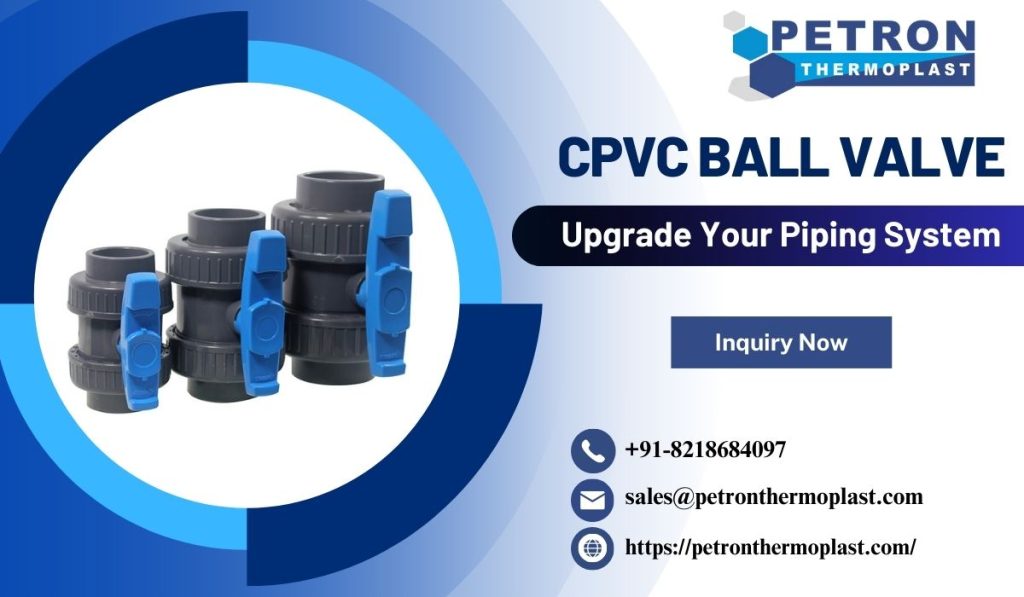In today’s industrial landscape, reliable flow control is critical for ensuring smooth, efficient, and safe operations. As industries handle a variety of corrosive fluids, hot media, and high-pressure processes, there is a growing demand for robust valves that can withstand demanding environments. One of the most dependable options available in the market is the CPVC Ball Valve. Built with Chlorinated Polyvinyl Chloride (CPVC), these valves offer cutting-edge performance and durability, making them an ideal choice for upgrading your existing piping systems. In this blog, we will explore why CPVC ball valves are used throughout industrial sectors and how they can bring exceptional value to your process systems.
What is a CPVC Ball Valve?
A CPVC ball valve is a quarter-turn valve that uses a spherical closure element (ball) to control the flow of media. Crafted from CPVC resin, which is an enhanced form of PVC with higher chlorine content, this valve is manufactured to handle higher temperatures and offer greater chemical resistance. The ball inside the valve has a hole through the center; when the ball is rotated 90°, the valve either opens or closes, allowing or restricting fluid flow. These valves are incredibly user-friendly and provide positive shutoff even after prolonged use.
Key Advantages of Using CPVC Ball Valves
- Temperature Resistance:
One of the primary features of CPVC ball valves is their ability to perform in high-temperature environments. While standard PVC valves have a temperature limit of around 60°C, CPVC valves can withstand temperatures up to 95°C. This makes them highly suitable for hot water transfer, chemical processing, and industrial fluid systems under elevated temperatures.
- Excellent Chemical Compatibility:
CPVC ball valves exhibit impressive resistance to corrosive chemicals, acids, alkalis, and salts. Unlike metal valves that may corrode or require internal linings, CPVC valves deliver long-term resistance without any additional coating. This makes them perfect for applications such as chemical dosing, water treatment processes, and corrosive media transport.
- Lightweight and Easy to Install:
CPVC ball valves are much lighter than their metal counterparts, making them easier to handle, transport, and install. Their compact and lightweight design also ensures reduced strain on the piping system and simplifies maintenance and replacement procedures.
- Superior Flow Control and Tight Shutoff:
The rounded ball design allows for unrestricted, straight-through flow and minimal pressure drop. The valve operates smoothly with a quarter-turn mechanism and delivers a leak-free shutoff, which is particularly useful for applications where precise on/off control is required.
Applications of CPVC Ball Valves
Chemical Processing:
CPVC ball valves are widely used in the chemical industry where corrosive fluids need to be safely handled. They maintain integrity even after continuous exposure to aggressive chemicals.
Water Treatment Facilities:
These valves serve important roles in water treatment plants for the distribution of clean water and handling of chemical additives used in purification processes.
Industrial Piping Systems:
Industries such as power generation, textile, and pulp & paper benefit from CPVC ball valves for process pipelines due to their durability and low maintenance requirements.
HVAC and Hot Water Distribution Systems:
CPVC ball valves maintain efficient flow control in HVAC systems and hot water piping circuits, thanks to their excellent heat tolerance.
Why Upgrade to CPVC Ball Valves?
Upgrading your piping system with CPVC ball valves brings immediate and long-term operational advantages. Aging or corroded metal valves can fail prematurely, incurring high repair and replacement costs. CPVC ball valves, however, offer outstanding durability and longevity in harsh operating environments. Their corrosion-resistant characteristics mean less downtime and fewer maintenance interventions. A simple quarter-turn operation makes them easy to use for both manual and automated flow control systems.
In addition, improved fluid handling efficiency reduces energy consumption and operational costs. The smooth internal surface of CPVC eliminates fluid turbulence and significantly minimizes pressure losses compared to metal valves that may develop internal corrosion or scaling over time. By upgrading your system, you not only enhance safety and reliability but also improve overall operational efficiency.
Maintenance Tips for CPVC Ball Valves
To ensure optimal performance and longevity, regular inspection and preventive maintenance are recommended. Always:
- Inspect seals and O-rings for wear or damage.
- Ensure that the valve is properly supported to avoid unnecessary stress on joints.
- Periodically operate the valve to prevent seizure due to long periods of inactivity.
- Avoid unnecessary exposure to UV sunlight if valves are installed outdoors – use protective covers where possible.
What to Consider When Selecting a CPVC Ball Valve?
When upgrading your system with CPVC ball valves, keep the following points in mind:
Valve Size and End Connections:
Select the right size that fits your existing pipework. CPVC ball valves are available with socket, threaded, or flanged end connections.
Pressure Rating:
Check the maximum allowable pressure of the valve and ensure that it matches your system requirements.
Type of Media:
Consider the chemical composition of the fluid being transported. CPVC performs well with most acids, bases, and salts, but always verify compatibility for specialty fluids.
Operating Temperature:
Confirm that the valve’s temperature rating meets your system’s operating conditions.
Certifications and Compliance:
Choose CPVC ball valves from a manufacturer that complies with relevant international standards and guidelines to ensure reliable performance.
Final Thoughts
Whether you are operating a chemical plant, water treatment facility, or industrial processing plant, CPVC ball valves offer exceptional value and durability for flow control applications. Their ability to withstand high temperatures and resist harsh chemicals makes them an excellent upgrade for outdated or corrosion-prone valves. Lightweight design, tight shutoff capability, and easy installation further add to their operational advantages.
By upgrading your piping system with high-quality CPVC ball valves, you can enjoy improved efficiency, enhanced safety, and long-term reliability. Investing in the right valve by Petron Thermoplast today is a proactive step toward minimizing operational risks and maximizing performance across the life of your system.







